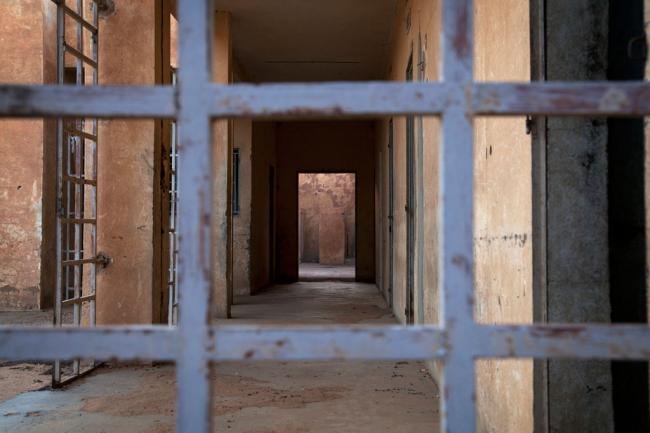
On World Day against Death Penalty, Ban says practice 'has no place in the 21st century'
“It has no place in the 21st century,” Ban stressed in his message for the Day, commemorated annually on 10 October. “To be legitimate and effective, counter-terror measures, like all security operations, must be anchored in respect for human rights and the rule of law,” he added.
Yet death sentences for terrorism are often handed down after unfair and speedy trials by military or special courts.
In his message, the UN chief noted that confessions were often obtained under duress or in other ways in which the right to appeal is not respected. Some States even sought to criminalize the legitimate exercise of fundamental freedoms by including vague definitions in counter-terrorism legislation.
“Let us be clear: participation in peaceful protests and criticism of a government – whether in private, on the Internet, or in the media – are neither crimes nor terrorist acts,” underscored Ban. “The threat or use of the death penalty in such cases is an egregious violation of human rights,” he added.
Some may argue that capital punishment would diminish terrorism, he went on to say, but, emphasized: “This is not true. Experience has shown that putting terrorists to death serves as propaganda for their movements by creating perceived martyrs and making their macabre recruiting campaigns more effective.”
He urged everyone to continue working to abolish the death penalty in all circumstances and places.
“Let our actions always be guided by the moral compass of human rights – the most effective route to a safer, more just and secure world,” concluded Ban.
No deterrent for terrorism
In Geneva, a group of UN human rights experts meanwhile has reminded Governments around the world that capital punishment is an ineffective deterrent for terrorism – and most times an unlawful one.
In a press statement, the UN Special Rapporteurs on summary executions, Agnes Callamard, on torture, Juan E. Méndez, and on human rights while countering terrorism, Ben Emmerson, stressed that the threat of terrorism does not justify departing from international standards for the protection of human rights.
Faced with terrorist attacks or terrorist threats in their countries, some governments have recently turned to the death sentence in an attempt to curb terrorist action, by either expanding the scope of offenses punishable by death or resuming executions for terrorist-related offences after years of moratoriums in executions.
“These measures are problematic in many ways,” warned the UN rights experts. “Reintroducing the death penalty in countries that were de jure or de facto abolitionist runs contrary to the international trend towards the progressive abolition of the death penalty.”
The General Assembly has repeatedly called on Member States to progressively restrict the use of the death penalty and reduce the number of crimes susceptible of such punishment.
In almost all regions in the world, Governments invoke the death penalty in anti-terrorism campaigns – with 15 nations having carried out executions over the last 10 years. In 2015capital punishment was imposed for these offences in at least seven countries, with most executions taking place in the Middle East and North Africa.
According to the UN experts, some countries made legal changes to introduce or expand the scope of the death penalty to terrorism-related offences.
They continued: “Many of those offenses do not amount to 'most serious crimes'– meaning those involving intentional killing – for which the death penalty may be imposed under international law.”
The experts pointed out that arbitrary sentencing exists in a small minority of countries around the world, which most frequently resort to capital punishment. They added that many States that use it for terrorism-related offences lack a system of fair trial.
“Executions carried out without adherence to the strictest guarantees of fair trial and due processes are unlawful and tantamount to an arbitrary execution,” emphasized the experts. “We have called on those governments once and again to halt such executions and to retrial the defendants in compliance with international standards,” they said.
The experts see the World Day against the Death Penalty as an opportunity to reflect on the worrying development.
Noting the world trend towards abolition, with new countries each year eradicating capital punishment, they said it was disturbing that a small minority of States disregarded international standards “in their quest to thwart a real or perceived threat posed by terrorism.”
Finally they encouraged everyone to reflect on the role that the international community can play in confronting the practice.
“We call on agencies and States offering financial or technical cooperation to counter terrorism to ensure that the programmes to which they contribute do not ultimately result in violations of the right to life,” concluded the UN experts.
Special Rapporteurs are appointed by the UN Human Rights Council and are independent from any government or organization and serve in their individual capacity.
Photo MINUSMA/Marco Dormino
Source: www.justearthnews.com
Support Our Journalism
We cannot do without you.. your contribution supports unbiased journalism
IBNS is not driven by any ism- not wokeism, not racism, not skewed secularism, not hyper right-wing or left liberal ideals, nor by any hardline religious beliefs or hyper nationalism. We want to serve you good old objective news, as they are. We do not judge or preach. We let people decide for themselves. We only try to present factual and well-sourced news.







